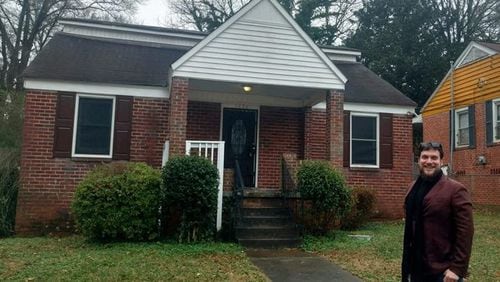The real estate industry is replete with tech-savvy start-up companies aiming to disrupt a massive market, but sometimes the disruptors get disrupted.
Take the case of Divvy Homes vs. Matthew Cardinale. Friday, a judge in Fulton County Superior Court will consider whether to break the contract between the company and a frustrated wannabe homeowner.
The San Francisco-based company and Cardinale, 37, had agreed that he would lease an Atlanta west side house that Divvy bought. Cardinale would make monthly payments that included rent, maintenance and a fund that would build toward a down-payment that would let him buy the house.
Now, Divvy may want out. It turns out that the home in the Hunter Hills neighborhood needed a lot more repairs than the company expected – and the company says it's not required to do all of them.
Divvy began operating in the Atlanta area several months ago.
The company targeted Atlanta because it's a big housing market. Executives told The Atlanta Journal-Constitution in February that they have an ambitious plan to tap the market's potential. Many people – especially younger households – do not have the large down-payment needed to buy a home. Others have decent income now but a sketchy credit history.
But if customers can make the monthly payments to a Divvy-owned house, they can build equity and eventually buy it, the company said.
Cardinale said the deal called for him to put down $4,500. He was to pay $1,250 a month, some of which went into a fund for a larger down-payment. And after three years, he could buy the home for $146,000.
The house was run down, said Cardinale. Windows didn't close. The foundation had structural damage. Running water was spotty.
“They probably should have done more diligence up-front on the house, and now they want to take away my house,” Cardinale said. “That’s just not fair.”
Cardinale called Divvy. The company made some repairs. But once it had spent about $12,000 on repairs to Cardinale’s home, it called halt.
And Cardinale called foul.
Divvy is the landlord, Cardinale says, so the law is clear about the company's responsibilities. It has to pay for repairs that bring it up to code – regardless of the cost, regardless of whether the expense interferes with the company's business plan.
Cardinale is an experienced housing advocate, a law student who has already appeared on his own behalf in court and a long-time renter who says he really wants to own a home.
Especially one in an up-and-coming neighborhood that is not too far from a trail to the Belt Line.
So when he felt Divvy wasn't living up to its end of the bargain, he went to city officials and to local media – including Atlanta Progressive News, where he is news editor.
The company admits some fault, but thinks too that Cardinale just may be a bit too aggressive in what he has asked, including asking to have his sneakers replaced because they were ruined by sewage under the house.
Not everything he wants is an issue of safety or health, said Brian Ma, Divvy's chief executive. "We want to make sure that he is not taking advantage of the system."
About the Author







